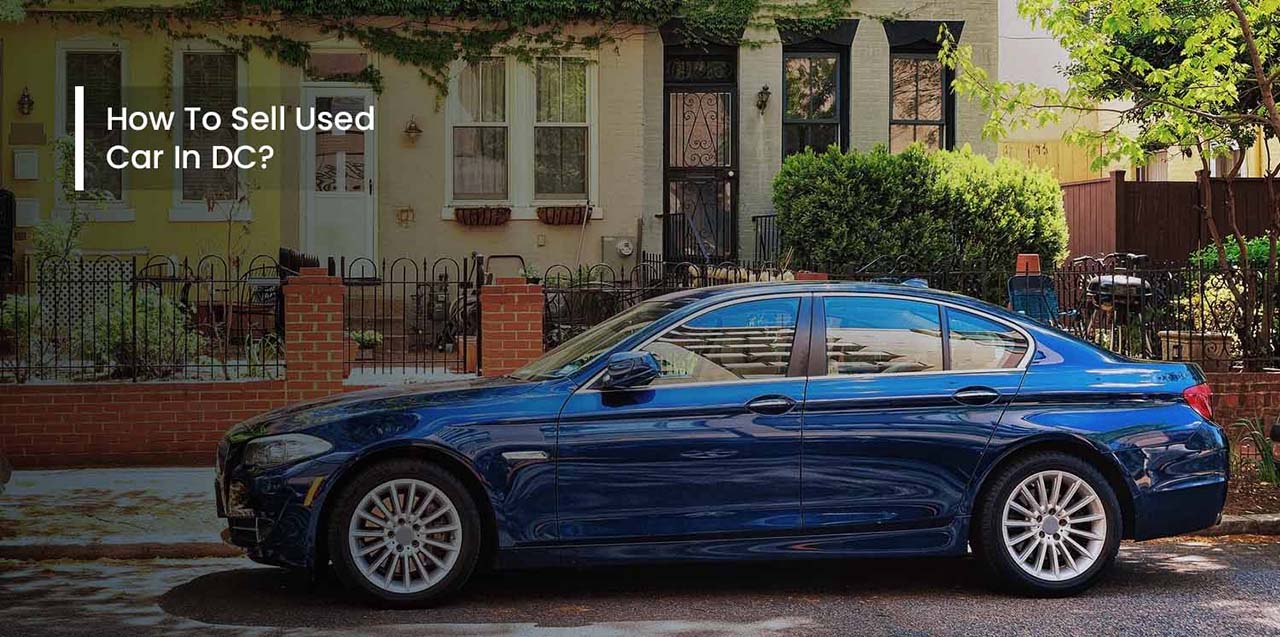How to Sell Used Car In DC?

The procedures and approach for selling a car online vary by state. Discover how to sell your used car or truck in the District of Columbia confidentially.
Yes, we are aware that D.C. isn't a state, but given its unique position as well as D.C.'s specific requirements regarding vehicle titling and registration, we wanted to make sure that if you live in the District of Columbia and are considering privately selling your old car or truck, you have the necessary tools. With an estimated 700,000 citizens and 360,000 registered trucks and vehicles in the District of Columbia, it's no surprise that thousands of private car owners in the nation's capital have used cashforcarsinc.com to sell their vehicles. We've outlined the six stages and documents required to sell a car in Washington, D.C. below. so that you may sell your automobile quickly and for the most amount of money.
Remember that in D.C., a private individual may sell up to five automobiles per calendar year without a dealer's license if all vehicles are titled in your name. Because D.C., like other states, considers the car title to be a legal document, both parties' legal names (no nicknames) should be used, as well as readable handwriting in black or blue ink. Mistakes, typos, and the use of whiteout may invalidate the document, so fill it out carefully and slowly.
Step 1: Allow the buyer to have a third party assess the vehicle
Many private automobile buyers pay for a pre-purchase vehicle check performed by a skilled and certified auto technician of their choice. Although the buyer pays for the inspection, the seller and buyer must agree on the date and location of the inspection. If the inspection reveals any problems with the vehicle, you should save the report for your records as the seller.
Step 2: Organize and collect all vehicle papers
Find all maintenance records, the owner's manual, and other vehicle-related papers. If you can offer the buyer thorough and detailed maintenance records, this will give the buyer confidence that you've maintained the automobile in an appropriate and regular manner. You should also think about providing a car history record from a provider like CarFax or AutoCheck. A free vehicle history report is automatically included when you sell your car on Cashforcarsinc. Paperwork Required Before Selling Your Car: Everything You Need to Know About.
In D.C., your vehicle emission inspection can be transferred to the buyer, so make sure the current inspection sticker is still on the car and valid until it expires. In D.C., personal vehicle inspections are valid for two years. If a lien exists on the title, the lienholder must release interest in the vehicle before it can be sold. This can be accomplished by selling the vehicle, paying it off, or obtaining a lien release from the lienholder. If you've misplaced your vehicle's registration card or sticker, you may replace it online.
Step 3: Create a Bill of Sale
Although a district of columbia bill of sale is not required by law for private automobile transactions in D.C., it is a good idea to use one. You may use a site like LegalZoom to print a bill of sale that you and your buyer can fill out and sign. All owner names from the car title should be listed on the bill of sale as a best practice. The same is true for the buyer's name(s). After that, it's a good idea for you, the seller, to create a copy of the bill of sale to keep as proof that the automobile has legally changed hands. Furthermore, a notary is not required to witness the Bill of Sale.
Step 4: Change the title
The D.C. vehicle title is the most critical document to have when selling an automobile. If the car's title has been lost, stolen, or severely damaged, and there is no lien on the vehicle, you can apply online for a duplicate replacement title. A Certificate of Title and Temporary Tag Application must be submitted, together with a valid picture identification of the car owner(s) and either the vehicle identification number, DC DM title number, or vehicle tag number. After your application is submitted, it usually takes seven to ten business days to be processed.
If two (2) owners are united by the conjunction "and" or if there is no conjunction between the names, they have tenancy in common ownership rights, and both owners (sellers) must sign the title application. Two (2) owners connected by the conjunction "or" or "and/or" have joint tenancy ownership rights with survivorship, and only one (1) owner (the seller) is necessary to sign the title. To register a car, at least one of the vehicle's owners must be a district resident. The automobile registration will only include the name of a D.C. resident. Complete the Certification of Odometer Mileage section on the back of the D.C. car title.
The National Highway Traffic Safety Administration's (NHTSA) odometer disclosure standards, which affect some private car purchases in D.C., were modified in December 2020. Any vehicle of the model year 2011 or newer (2012, 2013, etc.) that is transferred between January 1, 2021, and December 31, 2030, will need an odometer declaration. Beginning January 1, 2031, every vehicle less than 20 model years old will be required to have an odometer disclosure. Previously, the NHTSA only mandated disclosure for the first ten years. Cars manufactured before 2010 are exempt from odometer disclosures.
When giving an automobile to a relative, you can transfer the car title using the identical procedure explained here. If you are inheriting or acquiring a car following the death of the owner, the DMV in Washington, D.C., gives an overview of the process necessary for a vehicle obtained via the death of the owner.
Step 5: Take off your license plates and cancel your insurance
Before handing over the car to the buyer in D.C., the seller must remove their license plates. If you do not, you may be held accountable for any infractions that occur after the buyer takes ownership of the car. If you are not transferring your license plates to a new vehicle, you must surrender the plates to a D.C. DMV in person or by mail. You can initiate the online tag cancellation process. After removing your license plates, the buyer must visit a DMV service location to receive a temporary D.C. registration in order to take the vehicle through inspection at an inspection station. To avoid paying for insurance on a car you no longer own, cancel your insurance as soon as you remove your plates.
Step 6: Request a registration refund
If your car's registration is more than six months old and you do not intend to transfer it to another vehicle, you can obtain a pro-rated refund. Refunds are only granted every six months. Parking permits and inspection costs are not refundable.
For further information, visit the D.C. DMV website.
The Easier Way to Sell Your Car
Now that you've learned everything there is to know about selling a car in District Of Columbia , it's time to determine where to list it. It is simple to sell your car with Cashforcarsinc. With ready-to-sign state documentation, encrypted chat, and more, our platform provides all the tools and recommendations you need to make the transaction a breeze.
Visit for more information about How to Sell Used Car In Delaware? And sell a Used car in Connecticut.





